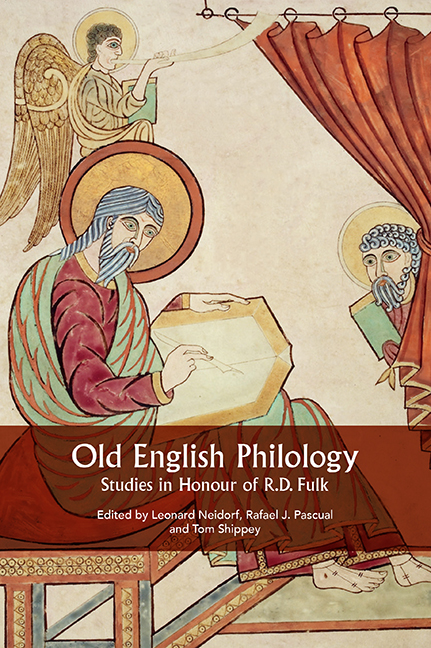Book contents
- Frontmatter
- Contents
- List of Illustrations
- Acknowledgements
- List of Contributors
- Introduction: R.D. Fulk and the Progress of Philology
- 1 Sievers, Bliss, Fulk, and Old English Metrical Theory
- 2 Ictus as Stress or Length: The Effect of Tempo
- 3 Metrical Criteria for the Emendation of Old English Poetic Texts
- 4 The Suppression of the Subjunctive in Beowulf: A Metrical Explanation
- 5 Metrical Complexity and Verse Placement in Beowulf
- 6 Alliterating Finite Verbs and the Origin of Rank in Old English Poetry
- 7 Prosody-Meter Correspondences in Late Old English and Poema Morale
- 8 The Syntax of Old English Poetry and the Dating of Beowulf
- 9 The Anglo-Saxons and Superbia: Finding a Word for it
- 10 Old English gelōme, gelōma, Modern English loom, lame, and Their Kin
- 11 Worm: A Lexical Approach to the Beowulf Manuscript
- 12 Wulfstan, Episcopal Authority, and the Handbook for the Use of a Confessor
- 13 Some Observations on e-caudata in Old English Texts
- 14 The Poetics of Poetic Words in Old English
- 15 Dream of the Rood 9b: A Cross as an Angel?
- 16 The Fate of Lot’s Wife: A ‘Canterbury School’ Gloss in Genesis A
- 17 Metrical Alternation in The Fortunes of Men
- 18 The Originality of Andreas
- 19 The Economy of Beowulf
- 20 Beowulf Studies from Tolkien to Fulk
- The Writings of R.D. Fulk
- Index
- Tabula Gratulatoria
- Anglo-Saxon Studies
6 - Alliterating Finite Verbs and the Origin of Rank in Old English Poetry
Published online by Cambridge University Press: 29 May 2021
- Frontmatter
- Contents
- List of Illustrations
- Acknowledgements
- List of Contributors
- Introduction: R.D. Fulk and the Progress of Philology
- 1 Sievers, Bliss, Fulk, and Old English Metrical Theory
- 2 Ictus as Stress or Length: The Effect of Tempo
- 3 Metrical Criteria for the Emendation of Old English Poetic Texts
- 4 The Suppression of the Subjunctive in Beowulf: A Metrical Explanation
- 5 Metrical Complexity and Verse Placement in Beowulf
- 6 Alliterating Finite Verbs and the Origin of Rank in Old English Poetry
- 7 Prosody-Meter Correspondences in Late Old English and Poema Morale
- 8 The Syntax of Old English Poetry and the Dating of Beowulf
- 9 The Anglo-Saxons and Superbia: Finding a Word for it
- 10 Old English gelōme, gelōma, Modern English loom, lame, and Their Kin
- 11 Worm: A Lexical Approach to the Beowulf Manuscript
- 12 Wulfstan, Episcopal Authority, and the Handbook for the Use of a Confessor
- 13 Some Observations on e-caudata in Old English Texts
- 14 The Poetics of Poetic Words in Old English
- 15 Dream of the Rood 9b: A Cross as an Angel?
- 16 The Fate of Lot’s Wife: A ‘Canterbury School’ Gloss in Genesis A
- 17 Metrical Alternation in The Fortunes of Men
- 18 The Originality of Andreas
- 19 The Economy of Beowulf
- 20 Beowulf Studies from Tolkien to Fulk
- The Writings of R.D. Fulk
- Index
- Tabula Gratulatoria
- Anglo-Saxon Studies
Summary
Old English metrical-grammatical theory is corroborated at almost every point by the alliterative practice of the poets. That this should be so is not surprising given that the theory was in considerable measure formulated on the basis of that practice. Accordingly, with but one class of exception, stressed elements and displaced sentence particles of the verse-clause alliterate when found in the alliterating positions of the line (and are presumed to be stressed), and un-displaced sentence particles and proclitics are regularly grouped at the start of the verseclause before the first stressed element without alliteration (or stress). The single significant mismatch between the alliterative and the metrical-grammatical systems remains the classical problem of Old English metrics: one group of un-displaced sentence particles, the finite verbs, frequently fails to behave according to rule. Some, as expected, do not alliterate, yet the majority do and many of these must be stressed—in contradiction of their metrical-grammatical identity.
The most influential modern approach to this problem is that of Alan Bliss in The Metre of Beowulf. Bliss analyses the finite verbs of that poem into nine groups according to their position in the verse-clause. Excluding the first, which contains only displaced finites, the eight groups containing un-displaced finites are as follows (with the number of such verbs alliterating in the poem, the number not alliterating, and the percentage alliterating listed in parenthesis):
2. The verb is in apposition to a verb in Group 1 which immediately precedes it (31, 2; 94%);
3. The verb is the only particle before the first stressed element (64, 19; 77%);
4. The verb is the last particle before the first stressed element (73, 2; 97%);
5. The verb is the last particle but one before the first stressed element (57, 48; 54%);
6. The verb is the last particle but two before the first stressed element (6, 3; 67%);
7. The verb forms a whole clause in itself (11, 2; 85%);
8. The verb is the last particle in a clause which contains no stressed elements (21, 0; 100%);
9. The verb is the last particle but one in a clause which contains no stressed elements (7, 3; 70%).
- Type
- Chapter
- Information
- Old English PhilologyStudies in Honour of R.D. Fulk, pp. 103 - 121Publisher: Boydell & BrewerPrint publication year: 2016
- 2
- Cited by



